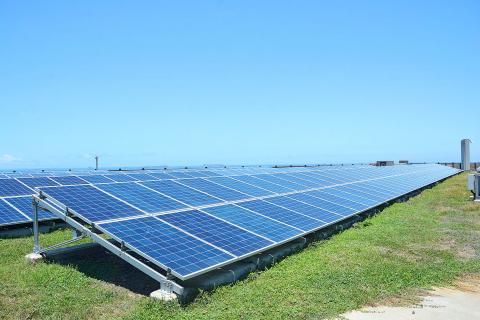Penghu County on Tuesday took a major step toward becoming a “low-carbon island” with the inauguration of a smart micro-power grid in Cimei Township (七美) that identifies the optimal mix of solar, wind and diesel-powered energy and generates electricity accordingly.
Part of the second phase of the Ministry of Science and Technology’s and state-run Taiwan Power Co’s (Taipower) National Energy Program, the power grid followed a phase-one photovoltaic system — which can generate up to 155 kilowatt-peak (kWp) of power — providing an additional 200kWp of power and an energy storage system that has 300 kilowatt-hours (kWh) of installed capacity.
The green power generation modules run in tandem with diesel generators in the township, forming an integral power grid.

Photo: CNA
The micro-power grid, based in Cimei Green Energy Park, would serve the goal of maximizing the output of green energy in the township, project director Chen Chao-shun (陳朝順) said, adding that alternating between solar, wind and diesel power enables the facility to overcome the sporadic nature of renewable energy sources.
Taipower expects to complete next year the construction of wind turbines with an installed capacity of 600kWh and expand the capacity of photovoltaics and the energy storage system by 1,200kWp and 2,000kWh respectively, which is expected to increase the yearly amount of renewable energy generated in the township to 3.37 million kilowatt-hours and cut costs from diesel power generation by NT$50 million (US$1.67 million).

Alain Robert, known as the "French Spider-Man," praised Alex Honnold as exceptionally well-prepared after the US climber completed a free solo ascent of Taipei 101 yesterday. Robert said Honnold's ascent of the 508m-tall skyscraper in just more than one-and-a-half hours without using safety ropes or equipment was a remarkable achievement. "This is my life," he said in an interview conducted in French, adding that he liked the feeling of being "on the edge of danger." The 63-year-old Frenchman climbed Taipei 101 using ropes in December 2004, taking about four hours to reach the top. On a one-to-10 scale of difficulty, Robert said Taipei 101

Nipah virus infection is to be officially listed as a category 5 notifiable infectious disease in Taiwan in March, while clinical treatment guidelines are being formulated, the Centers for Disease Control (CDC) said yesterday. With Nipah infections being reported in other countries and considering its relatively high fatality rate, the centers on Jan. 16 announced that it would be listed as a notifiable infectious disease to bolster the nation’s systematic early warning system and increase public awareness, the CDC said. Bangladesh reported four fatal cases last year in separate districts, with three linked to raw date palm sap consumption, CDC Epidemic Intelligence

Taiwanese and US defense groups are collaborating to introduce deployable, semi-autonomous manufacturing systems for drones and components in a boost to the nation’s supply chain resilience. Taiwan’s G-Tech Optroelectronics Corp subsidiary GTOC and the US’ Aerkomm Inc on Friday announced an agreement with fellow US-based Firestorm Lab to adopt the latter’s xCell, a technology featuring 3D printers fitted in 6.1m container units. The systems enable aerial platforms and parts to be produced in high volumes from dispersed nodes capable of rapid redeployment, to minimize the risk of enemy strikes and to meet field requirements, they said. Firestorm chief technology officer Ian Muceus said

MORE FALL: An investigation into one of Xi’s key cronies, part of a broader ‘anti-corruption’ drive, indicates that he might have a deep distrust in the military, an expert said China’s latest military purge underscores systemic risks in its shift from collective leadership to sole rule under Chinese President Xi Jinping (習近平), and could disrupt its chain of command and military capabilities, a national security official said yesterday. If decisionmaking within the Chinese Communist Party has become “irrational” under one-man rule, the Taiwan Strait and the regional situation must be approached with extreme caution, given unforeseen risks, they added. The anonymous official made the remarks as China’s Central Military Commission Vice Chairman Zhang Youxia (張又俠) and Joint Staff Department Chief of Staff Liu Zhenli (劉振立) were reportedly being investigated for suspected “serious